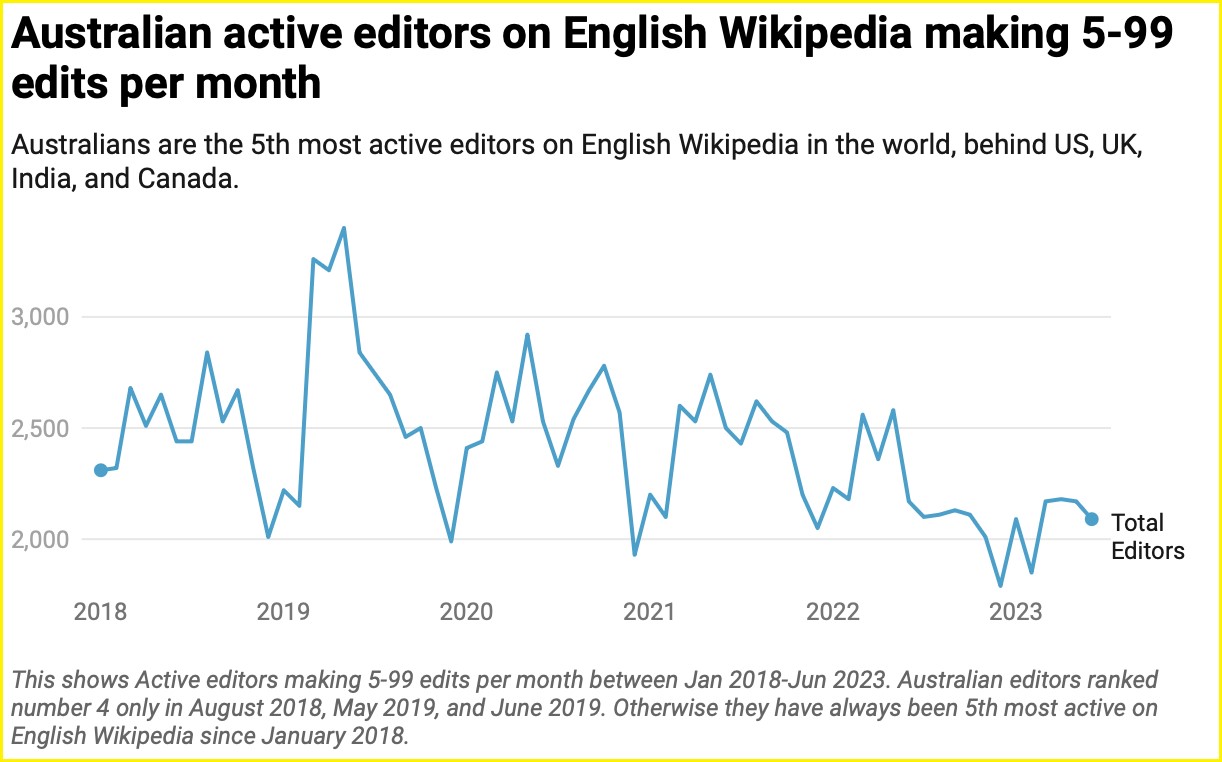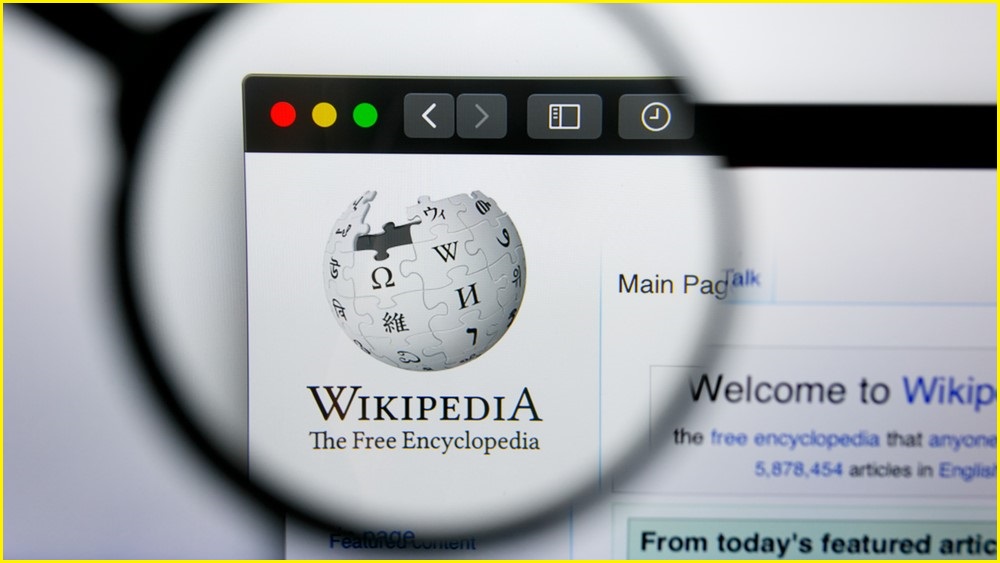Wikipedia editors in Australia are experiencing burnout following so-called “edit wars” over contentious topics and attempts to add First Nations place names to articles, causing some to leave the vocation, according to an Australian study.
Researchers at the University of Technology Sydney and the University of Melbourne interviewed 14 Wikipedia editors and analysed more than 35,000 articles about Australian places — including more than 500,000 edits of those pages — over a period of three years.
The study, published at the end of October, found English Wikipedia had “an anthropocentric and neo-colonial image of Australia as a place”, and attempts to change that image had led to controversy and conflict becoming “a common occurrence” between editors.
“Many Wikipedia editors’ experiences of contentiousness include burning out, running out of energy, and being drained,” the report found.
“… Although there is enthusiasm about including marginalised voices and filling in gaps on Wikipedia, this is being met by a spectrum of reluctance, hesitation, discomfort, sanitisation and also active resistance and racism.”
Lead researcher Heather Ford, an associate professor of digital and social media at the University of Technology Sydney, said contentious topics included First Nations place names, discussions of settler-colonialism, republicanism, and how historical events were presented.
While the study did not track how many Australian editors had recently stopped their work, there have been around 2,000 active Wikipedia editors in the country since June 2022 according to Wikimedia Statistics — down from earlier peaks of around 3,000.

Image: Supplied / Wikimedia Australia
‘I just ran out of energy’
An editor interviewed during the study who was given the pseudonym Lucas said he had stopped editing Wikipedia after being met with arguments and racism when attempting to incorporate and maintain First Nations place names on Australian pages.
Around 6 per cent of Australian places have both English and First Nations names on English Wikipedia, researchers said.
“To still have to be making these arguments — it’s just really, really frustrating,” Lucas said.
“And yeah, I just ran out of energy for it.”
Researchers said Lucas had tried to represent “marginalised aspects of place, such as queer, disabled and First Nations histories and experiences of a place”, which sometimes left him embroiled in “edit wars” with other Wikipedia editors who disagreed with his contributions.
Lucas described some of these disagreements as “satisfying” but found they became “more frustrating than anything else”, researchers said.
“Sometimes those with the most endurance will win such arguments,” they concluded.
Postdoctoral researcher Francesca Sidoti, part of the team which carried out the study, told Information Age that some editors intentionally moved from editing large, popular, and potentially contentious Wikipedia pages to smaller, less-viewed, and less-contentious ones.
“With the exception of one person who suggested they hadn’t changed how much they got involved in contentious discussions, pretty much everyone else had increasingly tried to avoid things that could lead to having an argument, or having their edits reverted instantly,” she said.
Editors largely white and male
The study found that Australian cities established by predominantly British settlers between the 18th and 19th centuries had the most Wikipedia articles written about them and received “considerably more attention” from editors.
Most editors who took part in the study believed those who edited Wikipedia articles about Australian places were tech-savvy and educated white men, which researchers said was consistent with previous research.
Some participants believed editors were also generally more “conservative-leaning”, while one said most of their discussions with other editors had been “very antagonistic and not particularly pleasant”.
Despite researchers' attempts to find a diversity of editors to interview, only one who took part identified as a woman, while one identified as non-binary, and none were First Nations people.
Lucas argued that “basically any non-white experiences or non-dominant experiences” were omitted from many Australian Wikipedia articles, while another said they felt Wikipedia was “quite a hostile space to marginalised people”, researchers said.
Sidoti said the experiences of editors such as Lucas could contribute to Wikipedia’s largely “white understanding of Australian place”, as including First Nations place names remained a major source of contention.
“Several people we spoke with had just completely burned out, because they had had really negative experiences,” she said.
“This was across maybe three or four participants who had various and very involved experiences of some people removing a lot of First Nations place names from different articles about Australian places.”
Wikimedia Australia acknowledges 'systemic biases'
Wikimedia Australia, the local chapter of the international Wikimedia Foundation, told Information Age it is committed to addressing “systemic biases” on Wikipedia while “striving for respectful and inclusive representation of Australia’s diverse histories and identities”.
The not-for-profit aimed to increase participation by First Nations people and other underrepresented communities but was “mindful that to make this happen more needs to be done to make Wikipedia a safe space for new contributors”, Wikimedia Australia president Elliott Bledsoe said in a statement.
Research commissioned by Wikimedia Australia has previously shown that First Nations people had both positive experiences and “significant challenges when editing and reading Wikipedia”, Bledsoe said.
Aside from disputes with other editors and gaps in representation, some editors’ decisions to stop editing was also impacted by their personal time constraints, Wikipedia’s technical complexity, and its strict editing policies, Bledsoe added.
“Wikimedia Australia is dedicated to a collaborative, inclusive and respectful environment on Wikipedia, where all voices can contribute meaningfully to shared knowledge,” he said.
“By supporting diverse contributors, particularly First Nations people, and addressing systemic biases, we aim to enrich the platforms’ content and reflect Australia’s true diversity.
“As we continue our efforts, we encourage all Australians to participate thoughtfully, helping shape a more accurate, welcoming and comprehensive resource, now and for the future.”
Wikipedia’s contribution to knowledge in a world of AI
The rise of popular generative artificial intelligence models such as OpenAI's ChatGPT and Google’s Gemini meant Wikipedia’s influence and standing as “the de facto global reference of knowledge" was increasingly important, UTS's Professor Ford said.
“The site and its associated platforms are core components of the knowledge ecosystem, used to train large language models like ChatGPT and as a data source for Google info boxes and voice assistants like [Apple’s] Siri and [Amazon’s] Alexa," she said.
“As a result, Wikipedia’s representations can have huge effects on what is known and understood about Australian places, particularly where its content doesn’t reflect the experience of all Australia’s peoples or all knowledge about Australian places.
“As an information source it can be both influential and partial.”
Some Wikipedia editors who took part in the study were driven by a sense of responsibility to accurately capture details about Australian places and their history — and they understood the impact the platform had on public knowledge, researchers said.
The study’s findings confirmed governments needed to incorporate “critical digital literacy skills in using Wikipedia and understanding its role in the wider digital and knowledge ecosystems” in education curricula, Professor Ford argued.
“And, for Wikimedia Foundation and Wikipedia editors,” she said, “there are significant implications for policy and practice in relation to engagement with First Nations content and experience.”










